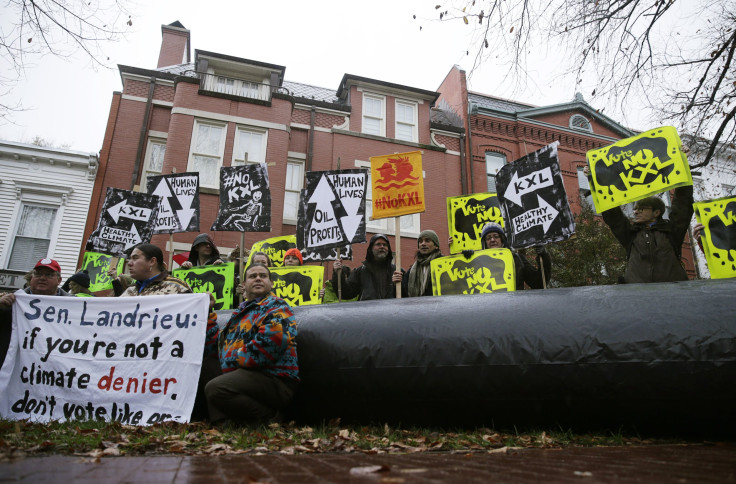Keystone XL Pipeline Vote: House GOP Takes Up Debate As Nebraska Supreme Court Approves Proposed Route

UPDATE 1:15 p.m. ET: The U.S. House voted 266-153 to permit construction of the Keystone XL pipeline without the White House's approval. The newly elected GOP Congress had vowed to move forward on the project despite President Barack Obama's vow to veto any legislation advancing the pipeline. Twenty-eight Democrats joined Republicans in supporting the legislation.
***
Nebraska’s Supreme Court overturned a lower court ruling Friday that would have blocked the Keystone XL pipeline’s proposed route through the state. The reversal removed a major hurdle for construction of the controversial pipeline only hours before House Republicans prepared to vote on a bill endorsing the project. President Barack Obama threatened earlier this week to veto the legislation that Republican congressmen have identified as a top priority for 2015.
The Nebraska Supreme Court’s ruling will allow the U.S. State Department, rather than local authorities, to determine whether the Keystone XL pipeline would benefit the nation. The Obama administration has highlighted concerns that the pipeline would increase carbon emissions while providing minimal relief to consumer gas prices.
The Nebraska court overturned a Lancaster County District Court ruling that found that a state law that allowed the governor to determine the route of the pipeline was unconstitutional. That means the pipeline can go through the state and that federal officials will now have to weigh in. The State Department halted its review of the Canada-to-Texas oil pipeline in April amid uncertainty about the Nebraska case, according to Politico.
“President Obama is now out of excuses for blocking the Keystone pipeline and the thousands of American jobs it would create. Finally, it’s time to start building," House Speaker John Boehner said in a statement.
White House officials said earlier this week that the State Department, not the president or Congress, should rule on the pipeline’s viability. “The fact is this piece of legislation is not altogether different than legislation that was introduced in the last Congress,” White House Press Secretary Josh Earnest said Tuesday. “I can confirm for you that if this bill passes this Congress, the president wouldn’t sign it either.”
Under the proposed plan, the pipeline would extend nearly 1,700 miles from Canada to Texas, with stops in Nebraska on its path. The initiative would purportedly bring more than 800,000 barrels of crude oil to the United States. Leading environmentalists argue the project will lead to a massive increase in air pollution, while advocates tout the Keystone pipeline’s ability to create jobs and support the country’s bid to become less dependent on foreign sources of oil.
“With the stroke of a pen, the president can create thousands of jobs by approving KXL,” American Petroleum Institute President and CEO Jack Gerard said in a statement. “The pipeline is a vital part of our North American energy renaissance and it has been delayed for far too long.”
Senate Republicans on Thursday advanced a bill to approve the construction, with the Republican-led Senate Energy Committee backing the measure in a 13-9 vote. It is scheduled to be sent to the full Senate for consideration next week.
House Republicans have already voted nine times to approve Keystone. A live stream of the debate Friday can be seen here.
© Copyright IBTimes 2024. All rights reserved.












